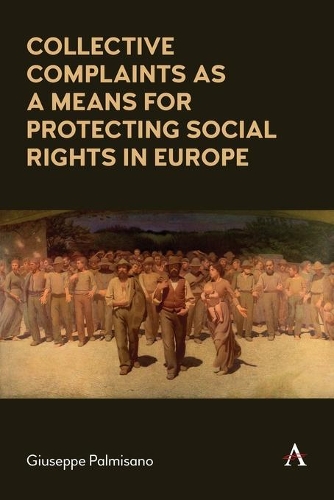
Collective Complaints As a Means for Protecting Social Rights in Europe
(Paperback)
Publishing Details
Collective Complaints As a Means for Protecting Social Rights in Europe
By (Author) Giuseppe Palmisano
Anthem Press
Anthem Press
11th January 2022
United Kingdom
Classifications
Professional and Scholarly
Non Fiction
International law
Employment and labour law: general
341.48094
Physical Properties
Paperback
80
Width 153mm, Height 229mm, Spine 26mm
454g
Description
The collective complaints procedure was created in 1995 as an optional quasi-jurisdictional monitoring mechanism specific for the protection of social rights, within the framework of the Council of Europe treaty system of the European Social Charter. In recent years, the importance and use of this procedure has increased considerably, in the context of a number of serious economic and social crises which are impacting negatively on the effective enjoyment of social rights in Europe. This short monograph explores and clarifies the specific features, the potential and limits of the collective complaints procedure, intended as a sui generis instrument for the protection of social rights, in the light of its evolutive application by the European Committee of Social Rights (the monitoring body of the European Social Charter) and its real impact on the state and conditions of social rights in the European countries concerned.
Reviews
The collective complaints procedure before the European Committee of Social Rights is one of the most powerful tools to uphold social rights in Europe, yet it is also among the least well understood. Giuseppe Palmisano is uniquely well positioned to provide this assessment: his contribution is an indispensable guide not only to the users, but also to all those who care about social justice in Europe. Olivier De Schutter is the UN Special Rapporteur on extreme poverty and human rights.
The arguments in the book are well-supported by primary materials from the European Social Charter system, and the author demonstrates a deep understanding of that material. Appropriate use is made of international law scholarship and general international human rights law scholarship. The book addresses all the key issues of the collective complaints system and stays focused on those issues. Dr Holly Cullen, The University of Western, Canada
One of the greatest virtues of the book lies in underlining the specific nature and impact of the collective complaints procedure before the European Committee of Social Rights as the most effective mechanism in Europe in the field of social rights. Dr. Jimena Quesada, University of Valencia, Spain
Author Bio
Giuseppe Palmisano, former President and currently General Rapporteur of the European Committee of Social Rights, is Full Professor of International Law at the University of Roma Tre.
